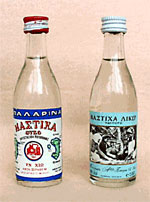Mastika

Masticha or "'Mastika'" (from Greek: μαστίχα (< mastich(a)o "to chew, to gnash the teeth"), mastícha; South Slavic languages: мастика, mastika; Romanian: mastică) is originally a liquor seasoned with the resin of the mastic tree. Mastic trees, which are small evergreen trees native to the Mediterranean region, growing as far west as Morocco and Iberia and to the east as far as Turkey. Though the tree grows far and wide, the famed Masticha resin can only be produced from the Chios Mastic tree[1]. .
In Greece two such alcoholic beverages are known under the umbrella term Mastichato: one is a liqueur, the other is a strong spirit similar to ouzo and tsikoudia (a strong Cretan Raki). It is served cold or at room temperature but usually with ice. They turn white when poured over ice or mixed with water, and form small crystals when frozen. They are served with various mezedes — appetizers such as octopus, salad, sardines, calamari, fried zucchini, and clams, among others.
The word Mastika is also widely used in neighboring countries for an anise-flavored liqueur popular in the southern Balkans. It is considered the 'national drink' of the Republic of Macedonia containing 45% alcohol, has a hot taste not unlike that of brandy and is usually made from grapes, raisins, plums or figs. It is usually poured over ice and enjoyed with Meze.
In Bulgaria, it is often combined with Menta, a mint liqueur, to make a traditional cocktail called cloud (Bulgarian: облак). In Romania, it is used as a wedding toast, where it often is thought of as a good accompaniment to traditional chicken dishes.
There are similar liqueurs in Greece as ouzo, tsipouro, tsikoudia and raki, in Turkey also as rakı and in Persia as arak.
The denominations in the Balkans generally differ from the Mediterranean ones, although very similar products exist in both regions. This sometimes leads to confusion. For instance, Serbian, Bulgarian and Macedonian rakia (or rakija) is a fruit brandy, which is never flavored with anise.
Production
The production of mastika usually starts with alcoholic base of raki or rakija, made from fermented and twice distilled fruit (usually grapes) that is filtered through the roots of the mastic (Pistacia lentiscus). The alcohol can also be mixed with the resin of the tree to give the alcoholic drink its distinctive taste.
Cultural significance
Mastika is also the title of a popular song in Turkish Roma music (Download sample). Popular in some Balkan regions.
From a female version of the lyrics: "If you collect all the stars in sky and throw them on my lap, in return I'll give you nine kids to have. // A-a-a, Mastika, mastika... // If you paint my body all in honey, I'll let you love me from my head to my toes... // A-a-a, Mastika, mastika..."
- ^ Epikouria Magazine, Fall/Winter 2005
